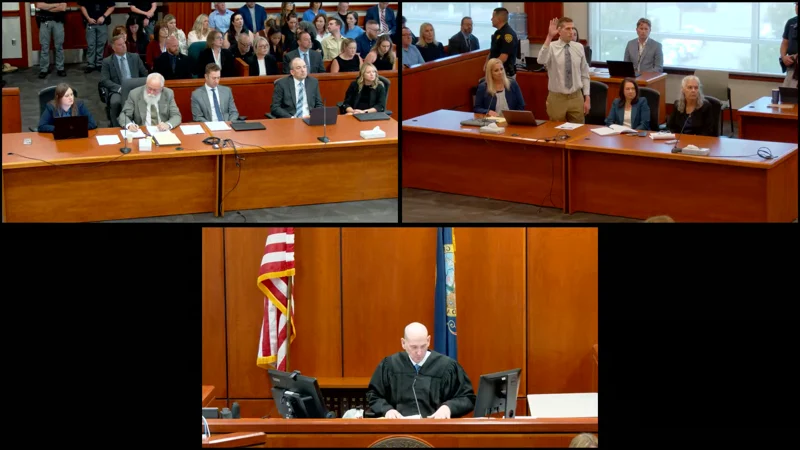Two-and-a-half years after the stabbing deaths of four University of Idaho students, the man who committed the murders has admitted his guilt.
Inside an Ada County, Idaho, courtroom Wednesday, 30-year-old Bryan Kohberger told Judge Steven Hippler he committed the premeditated murders of Kaylee Goncalves, Madison Mogen, Ethan Chapin and Xana Kernodle on Nov 13, 2022, inside an off-campus rental house near the University of Idaho, where the four victims were all students.
The plea deal, which allows Kohberger, a doctoral student in criminal justice at nearby Washington State University when he committed the murders, to avoid a potential death penalty upon conviction was announced Monday. The victim families only learned of a possible plea deal last Friday and the family of Kaylee Goncalves was outraged, as they wanted the defendant put to death if found guilty.
Facebook posts from the Goncalves family urged people to contact Judge Hippler to ask him not to accept the plea deal.
Hippler said many of the emails and calls he received were out of line, insisting they would have no influence on his decision.
“There have been calls by some for the public to contact me and my office in an attempt to influence my decision making in this case. This has been extraordinarily disruptive for court staff… It’s also highly inappropriate. The court is not supposed to, and this court will never take into account public sentiment, in making an opinion regarding its judicial decisions,” Hippler said as the hearing began. “I have not read any of the numerous messages nor listened to any of the numerous voicemails that have been sent to me and my staff. Those have all been forwarded to security and where appropriate to law enforcement.”
Hippler then offered an apology to the families.
“To the victim’s families and family of the defendant for the short notice for today’s hearing, and I’m sure what must have been the hurried efforts to get here. I like most everyone else, learned of this plea agreement Monday afternoon and had no inkling of it beforehand,” he said. “Once I learned of the defendant’s decision to change his plea in this case, it was important that I take the plea as soon as possible.”
Hippler explained time was of the essence because otherwise trial was slated to begin next month with the potential of having up to 10,000 juror questionnaires to process ahead of trial.
Kohberger sat emotionless at the defense table with his legal team as Hippler read from the plea agreement the defendant had already signed, stating he was pleading guilty to burglary and four counts of first-degree murder.
“Defendant, as part of the plea agreement, waves his right to appeal as well as his right to appeal the sentence and his right to seek a leniency for reconsideration of the sentence,” Hippler stated.
Kohberger then stood as the judge ensured he was making the plea deal with full understanding of what it meant.
“I want to make sure your plea is given voluntarily, and I want to make sure that you actually committed the crimes to which you’re pleading guilty, because I don’t want you to plead guilty to a crime you didn’t commit. Do you understand that?” the judge asked.
“Yes,” Kohberger replied.
“Are you pleading guilty because you are guilty?” asked Hippler.
“Yes,” stated the defendant.
Hippler continued with a series of questions to ensure Kohberger understood what rights he was giving up with the plea.
The judge then read each count against the defendant, that would have to have been proven at trial, starting with count one, the burglary charge on or about Nov 13, 2022.
“As to count two, the state would have to have proven that on or about that same date in Latah County you did willfully, unlawfully, deliberately, and with premeditation and malice of forethought, kill and murder Madison Mogen, a human being, by stabbing Madison Mogen, from which she died,” read Hippler.
He continued on with counts three, four and five.
“Do you understand that by pleading guilty, the state no longer has to prove those things because you’re admitting those things are true?” asked Hippler.
“Yes,” said Kohberger.
Ada County Prosecutor Bill Thompson then shared an overview of the state’s evidence against Kohberger, including his DNA left on a knife sheath next to the body of one of the victims. The murder weapon, a Kabar knife, was never found, but an Amazon search on the killers phone showed he was looking to purchase a new KA-BAR knife in the days after the murders.
Thompson teared up as he concluded reading each of the victim’s names.
Sentencing, which will be life in prison without the possibility of parole, is set for July 23. Judge Hippler set an entire day aside for the hearing, to give family members time to make statements in court ahead of final sentencing.
Hippler reminded the defense team that from here on out, Kohberger would appear wearing jail garb, rather than plain clothes as he is now a convicted murderer.
None of the families spoke with the media just after the hearing.






